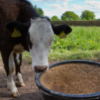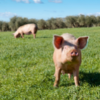-

Aug
07
Interpretive Summary: Development of a model to predict dietary metabolizable energy from digestible energy in beef cattle

Understanding the utilization of feed energy is essential for precision feeding in the production of beef cattle. A study recently published in the Journal of Animal Science aimed to assess whether predicting the metabolizable energy to digestible energy ratio, rather than a prediction of metabolizable energy with digestible energy, is feasible; in addition, the research team aimed to develop a model equation to predict metabolizable energy based on digestible energy measurement and dietary components in beef cattle.
Read more
-

Aug
07
Interpretive Summary: Programming of postnatal phenotype caused by exposure of cultured embryos from Brahman cattle to colony-stimulating factor 2 and serum
.png?sfvrsn=20284fd1_0)
It is known that alterations in the environment of the preimplantation embryo can affect competence to establish pregnancy and phenotype of resultant calves, but there is no clear evidence for the effects of serum on postnatal phenotype of calves. A study recently published in the Journal of Animal Science evaluated the postnatal programming actions of the embryokine colony-stimulating factor 2 and serum using Brahman embryos produced in vitro.
Read more
-

Aug
07
Interpretive Summary: Efficacy of phage therapy in pigs

While antibiotics are the cornerstone of disease control in livestock, there are growing global concerns over the emergence of antibiotic resistant bacteria and numerous countries have implemented policies to reduce the routine use of antibiotics in livestock. Therefore, research is needed to identify alternative methods for disease control.
Read more
-

Aug
05
Interpretive Summary: Greater ileal digestibility of amino acids in sunflower expellers than sunflower meal in growing pigs
.png?sfvrsn=4b104fd1_0)
Currently, amino acids (AA) in poultry and livestock feed are primarily derived from soybean meal. Cheaper and more sustainable alternatives to soybean meal are needed. One such alternative is sunflower coproducts.
Read more
-

Aug
05
Interpretive Summary: Wingless-type mouse mammary tumor virus integration site regulation of bovine theca cells
0b9d2d897d8c62e581bfff00009094bd.png?sfvrsn=89114fd1_0)
Wingless-type mouse mammary tumor virus integration site (WNT) signaling molecules are intraovarian factors that may influence follicular maturation and development. It is hypothesized that WNT ligands and frizzled family members (FZD) impact ovarian paracrine function and mammalian follicular development.
Read more
-

Aug
05
Zimmermann breed heterotic mature weight cattle
91a02d897d8c62e581bfff00009094bd.png?sfvrsn=132c4fd1_0)
The mature weight of cows at slaughter has increased over the last several decades, making the day-to-day management and feeding costs can also increase. This can affect the efficiency of cattle production, but most studies have demonstrated that the association between cow weight and efficiency is highly dependent on environment.
Read more
-

Aug
05
2021 National ASAS-Academic Quadrathlon

After a virtual Academic Quadrathlon (AQ) in 2020, the 2021 National ASAS-AQ was conducted during the annual ASAS meeting in Louisville, Ky with the AQ event being hosted by the University of Kentucky, Department of Animal and Food Sciences in Lexington on July 17 and 18.
Read more
-

Aug
02
Intracellular Ca2+ signaling and ORAI calcium release-activated calcium modulator 1 are associated with hepatic lipidosis in dairy cattle
.png?sfvrsn=57014fd1_0)
A study recently published in the Journal of Animal Science investigated the role of ORAI calcium release-activated calcium modulator 1 on hepatic lipidosis via endoplasmic reticulum stress in dairy cows. Fatty liver is a common metabolic disorder affecting dairy cows during the periparturient period and is closely associated with endoplasmic reticulum stress.
Read more
-

Aug
02
Breed and heterotic effects for mature weight in beef cattle
a58d2d897d8c62e581bfff00009094bd.png?sfvrsn=27014fd1_0)
Cow mature weight affects the costs and efficiency of a breeding operation and has increased considerably over the past 30 years. Cow mature weight is influenced by genetics and the environment, which means producers need tools to incorporate cow mature weight in their selection of cattle breeds and herd replacements.
Read more
-

Aug
02
Providing domperidone throughout lactation enhances sow lactation performance
.png?sfvrsn=d4014fd1_0)
Starting at approximately 8 to 10 days of lactation, sows can no longer produce enough milk to sustain optimal growth of their piglets, an issue that has been exacerbated with the current use of hyperprolific sow lines. Therefore, it is crucial to develop strategies to increase sow milk production.
Read more
-

Jul
29
Washington Roundup – July 2021
.png?sfvrsn=cb0a4fd1_0)
On June 30th, the House Appropriations Committee approved its version of agriculture appropriations for fiscal year 2022. The agriculture appropriations bill provides discretionary funding of $26.55 billion, which is $2.851 billion above 2021. The Committee also released the accompanying report that includes detailed funding levels for individual USDA programs.
Read more
-

Jul
29
Year-Round Pork Needs Year-Round Workers

The National Pork Producers Council (NPPC) has announced a new initiative to highlight the importance of foreign-born workers across the American pork industry and the need for broad labor reform to address labor shortages.
Read more
-

Jul
29
USDA To Re-Examine Organic Livestock Rule
.png?sfvrsn=baf14fd1_0)
The United States Department of Agriculture’s (USDA) Agriculture Secretary Tom Vilsack released a statement regarding the Organic Livestock and Poultry Practices (OLPP) final rule. The OLPP sets production standards for organic livestock and poultry, including raising, transport, and slaughter.
Read more
-

Jul
29
Study Finds New Farming Techniques Could Reduce Greenhouse Gases by 70%
.png?sfvrsn=d0f14fd1_0)
A new study published in Proceedings of the National Academy of Sciences of the United States of America found that changes in farming practices in grain production could reduce greenhouse gas (GHG) emissions by 70% by 2036.
Read more
-

Jul
29
The Role of Agricultural Science and Technology in Climate 21 Project Implementation Published
.png?sfvrsn=8af14fd1_0)
The Council for Agricultural Science and Technology (CAST) has released a new paper, The Role of Agricultural Science and Technology in Climate 21 Project Implementation. This publication examines nutrient and pest management, animal systems, agricultural technologies, food supply chain, and carbon markets.
Read more
-

Jul
29
Study Finds Most Profit Made from Grocery Stores Does Not Go to Farmers
.png?sfvrsn=2f14fd1_0)
A new study published in Nature, Post-farmgate food value chains make up most of consumer food expenditures globally, discovered that farmers make less than 25% of what consumers spend at the grocery stores, and around 7% less than that for food that is consumed at restaurants, or outside of the home.
Read more
-

Jul
29
PRIME Act Introduced
.png?sfvrsn=21f14fd1_0)
The Processing Revival and Intrastate Meat Exemption Act (PRIME Act) was re-introduced to the House. The same bill was also introduced to the Senate. The PRIME Act would expand the exemption of custom slaughtering of animals from federal inspection requirements.
Read more
-

Jul
29
NPPC calls for delay for California Prop 12 implementation
.png?sfvrsn=6ef24fd1_0)
The United States Supreme Court announced it will not hear the North American Meat Institute’s (NAMI) case against Proposition 12 (Prop 12) in California. The case was denied without explanation. Prop 12 will become law in 2022, but numerous organizations have called for a delay.
Read more
-

Jul
29
New bill Would Provide More Plant-Based Choices in Schools
087f2d897d8c62e581bfff00009094bd.png?sfvrsn=8af34fd1_0)
Two Democratic members of Congress, Nydia M. Velazquez (D-NY) and Jamaal Bowman, Ed.D (D-NY), have recently introduced a bill that would create a voluntary grant program for school districts to help schools provide additional plant-based options. The “Healthy Future Students and Earth Pilot Program Act” is intended to help combat the climate crisis as well.
Read more
-

Jul
29
Meat Sales Down and Prices are Increasing Across the World

Just in time for grilling season, meat prices are increasing globally. A report in Bloomberg found in the United States, the sales of meat at grocery stores are down by 12% from the previous year. Due to the global supply chain issues caused by the COVID-19 pandemic, the price of meat has been rising since October 2020.
Read more
 AugInterpretive Summary: Development of a model to predict dietary metabolizable energy from digestible energy in beef cattle
AugInterpretive Summary: Development of a model to predict dietary metabolizable energy from digestible energy in beef cattle Understanding the utilization of feed energy is essential for precision feeding in the production of beef cattle. A study recently published in the Journal of Animal Science aimed to assess whether predicting the metabolizable energy to digestible energy ratio, rather than a prediction of metabolizable energy with digestible energy, is feasible; in addition, the research team aimed to develop a model equation to predict metabolizable energy based on digestible energy measurement and dietary components in beef cattle.
Understanding the utilization of feed energy is essential for precision feeding in the production of beef cattle. A study recently published in the Journal of Animal Science aimed to assess whether predicting the metabolizable energy to digestible energy ratio, rather than a prediction of metabolizable energy with digestible energy, is feasible; in addition, the research team aimed to develop a model equation to predict metabolizable energy based on digestible energy measurement and dietary components in beef cattle. AugInterpretive Summary: Programming of postnatal phenotype caused by exposure of cultured embryos from Brahman cattle to colony-stimulating factor 2 and serum
AugInterpretive Summary: Programming of postnatal phenotype caused by exposure of cultured embryos from Brahman cattle to colony-stimulating factor 2 and serum.png?sfvrsn=20284fd1_0) It is known that alterations in the environment of the preimplantation embryo can affect competence to establish pregnancy and phenotype of resultant calves, but there is no clear evidence for the effects of serum on postnatal phenotype of calves. A study recently published in the Journal of Animal Science evaluated the postnatal programming actions of the embryokine colony-stimulating factor 2 and serum using Brahman embryos produced in vitro.
It is known that alterations in the environment of the preimplantation embryo can affect competence to establish pregnancy and phenotype of resultant calves, but there is no clear evidence for the effects of serum on postnatal phenotype of calves. A study recently published in the Journal of Animal Science evaluated the postnatal programming actions of the embryokine colony-stimulating factor 2 and serum using Brahman embryos produced in vitro. AugInterpretive Summary: Efficacy of phage therapy in pigs
AugInterpretive Summary: Efficacy of phage therapy in pigs While antibiotics are the cornerstone of disease control in livestock, there are growing global concerns over the emergence of antibiotic resistant bacteria and numerous countries have implemented policies to reduce the routine use of antibiotics in livestock. Therefore, research is needed to identify alternative methods for disease control.
While antibiotics are the cornerstone of disease control in livestock, there are growing global concerns over the emergence of antibiotic resistant bacteria and numerous countries have implemented policies to reduce the routine use of antibiotics in livestock. Therefore, research is needed to identify alternative methods for disease control. AugInterpretive Summary: Greater ileal digestibility of amino acids in sunflower expellers than sunflower meal in growing pigs
AugInterpretive Summary: Greater ileal digestibility of amino acids in sunflower expellers than sunflower meal in growing pigs.png?sfvrsn=4b104fd1_0) Currently, amino acids (AA) in poultry and livestock feed are primarily derived from soybean meal. Cheaper and more sustainable alternatives to soybean meal are needed. One such alternative is sunflower coproducts.
Currently, amino acids (AA) in poultry and livestock feed are primarily derived from soybean meal. Cheaper and more sustainable alternatives to soybean meal are needed. One such alternative is sunflower coproducts. AugInterpretive Summary: Wingless-type mouse mammary tumor virus integration site regulation of bovine theca cells
AugInterpretive Summary: Wingless-type mouse mammary tumor virus integration site regulation of bovine theca cells0b9d2d897d8c62e581bfff00009094bd.png?sfvrsn=89114fd1_0) Wingless-type mouse mammary tumor virus integration site (WNT) signaling molecules are intraovarian factors that may influence follicular maturation and development. It is hypothesized that WNT ligands and frizzled family members (FZD) impact ovarian paracrine function and mammalian follicular development.
Wingless-type mouse mammary tumor virus integration site (WNT) signaling molecules are intraovarian factors that may influence follicular maturation and development. It is hypothesized that WNT ligands and frizzled family members (FZD) impact ovarian paracrine function and mammalian follicular development. AugZimmermann breed heterotic mature weight cattle
AugZimmermann breed heterotic mature weight cattle91a02d897d8c62e581bfff00009094bd.png?sfvrsn=132c4fd1_0) The mature weight of cows at slaughter has increased over the last several decades, making the day-to-day management and feeding costs can also increase. This can affect the efficiency of cattle production, but most studies have demonstrated that the association between cow weight and efficiency is highly dependent on environment.
The mature weight of cows at slaughter has increased over the last several decades, making the day-to-day management and feeding costs can also increase. This can affect the efficiency of cattle production, but most studies have demonstrated that the association between cow weight and efficiency is highly dependent on environment. Aug2021 National ASAS-Academic Quadrathlon
Aug2021 National ASAS-Academic Quadrathlon After a virtual Academic Quadrathlon (AQ) in 2020, the 2021 National ASAS-AQ was conducted during the annual ASAS meeting in Louisville, Ky with the AQ event being hosted by the University of Kentucky, Department of Animal and Food Sciences in Lexington on July 17 and 18.
After a virtual Academic Quadrathlon (AQ) in 2020, the 2021 National ASAS-AQ was conducted during the annual ASAS meeting in Louisville, Ky with the AQ event being hosted by the University of Kentucky, Department of Animal and Food Sciences in Lexington on July 17 and 18. AugIntracellular Ca2+ signaling and ORAI calcium release-activated calcium modulator 1 are associated with hepatic lipidosis in dairy cattle
AugIntracellular Ca2+ signaling and ORAI calcium release-activated calcium modulator 1 are associated with hepatic lipidosis in dairy cattle.png?sfvrsn=57014fd1_0) A study recently published in the Journal of Animal Science investigated the role of ORAI calcium release-activated calcium modulator 1 on hepatic lipidosis via endoplasmic reticulum stress in dairy cows. Fatty liver is a common metabolic disorder affecting dairy cows during the periparturient period and is closely associated with endoplasmic reticulum stress.
A study recently published in the Journal of Animal Science investigated the role of ORAI calcium release-activated calcium modulator 1 on hepatic lipidosis via endoplasmic reticulum stress in dairy cows. Fatty liver is a common metabolic disorder affecting dairy cows during the periparturient period and is closely associated with endoplasmic reticulum stress. AugBreed and heterotic effects for mature weight in beef cattle
AugBreed and heterotic effects for mature weight in beef cattlea58d2d897d8c62e581bfff00009094bd.png?sfvrsn=27014fd1_0) Cow mature weight affects the costs and efficiency of a breeding operation and has increased considerably over the past 30 years. Cow mature weight is influenced by genetics and the environment, which means producers need tools to incorporate cow mature weight in their selection of cattle breeds and herd replacements.
Cow mature weight affects the costs and efficiency of a breeding operation and has increased considerably over the past 30 years. Cow mature weight is influenced by genetics and the environment, which means producers need tools to incorporate cow mature weight in their selection of cattle breeds and herd replacements. AugProviding domperidone throughout lactation enhances sow lactation performance
AugProviding domperidone throughout lactation enhances sow lactation performance.png?sfvrsn=d4014fd1_0) Starting at approximately 8 to 10 days of lactation, sows can no longer produce enough milk to sustain optimal growth of their piglets, an issue that has been exacerbated with the current use of hyperprolific sow lines. Therefore, it is crucial to develop strategies to increase sow milk production.
Starting at approximately 8 to 10 days of lactation, sows can no longer produce enough milk to sustain optimal growth of their piglets, an issue that has been exacerbated with the current use of hyperprolific sow lines. Therefore, it is crucial to develop strategies to increase sow milk production. JulWashington Roundup – July 2021
JulWashington Roundup – July 2021.png?sfvrsn=cb0a4fd1_0) On June 30th, the House Appropriations Committee approved its version of agriculture appropriations for fiscal year 2022. The agriculture appropriations bill provides discretionary funding of $26.55 billion, which is $2.851 billion above 2021. The Committee also released the accompanying report that includes detailed funding levels for individual USDA programs.
On June 30th, the House Appropriations Committee approved its version of agriculture appropriations for fiscal year 2022. The agriculture appropriations bill provides discretionary funding of $26.55 billion, which is $2.851 billion above 2021. The Committee also released the accompanying report that includes detailed funding levels for individual USDA programs. JulYear-Round Pork Needs Year-Round Workers
JulYear-Round Pork Needs Year-Round Workers The National Pork Producers Council (NPPC) has announced a new initiative to highlight the importance of foreign-born workers across the American pork industry and the need for broad labor reform to address labor shortages.
The National Pork Producers Council (NPPC) has announced a new initiative to highlight the importance of foreign-born workers across the American pork industry and the need for broad labor reform to address labor shortages. JulUSDA To Re-Examine Organic Livestock Rule
JulUSDA To Re-Examine Organic Livestock Rule.png?sfvrsn=baf14fd1_0) The United States Department of Agriculture’s (USDA) Agriculture Secretary Tom Vilsack released a statement regarding the Organic Livestock and Poultry Practices (OLPP) final rule. The OLPP sets production standards for organic livestock and poultry, including raising, transport, and slaughter.
The United States Department of Agriculture’s (USDA) Agriculture Secretary Tom Vilsack released a statement regarding the Organic Livestock and Poultry Practices (OLPP) final rule. The OLPP sets production standards for organic livestock and poultry, including raising, transport, and slaughter. JulStudy Finds New Farming Techniques Could Reduce Greenhouse Gases by 70%
JulStudy Finds New Farming Techniques Could Reduce Greenhouse Gases by 70%.png?sfvrsn=d0f14fd1_0) A new study published in Proceedings of the National Academy of Sciences of the United States of America found that changes in farming practices in grain production could reduce greenhouse gas (GHG) emissions by 70% by 2036.
A new study published in Proceedings of the National Academy of Sciences of the United States of America found that changes in farming practices in grain production could reduce greenhouse gas (GHG) emissions by 70% by 2036. JulThe Role of Agricultural Science and Technology in Climate 21 Project Implementation Published
JulThe Role of Agricultural Science and Technology in Climate 21 Project Implementation Published.png?sfvrsn=8af14fd1_0) The Council for Agricultural Science and Technology (CAST) has released a new paper, The Role of Agricultural Science and Technology in Climate 21 Project Implementation. This publication examines nutrient and pest management, animal systems, agricultural technologies, food supply chain, and carbon markets.
The Council for Agricultural Science and Technology (CAST) has released a new paper, The Role of Agricultural Science and Technology in Climate 21 Project Implementation. This publication examines nutrient and pest management, animal systems, agricultural technologies, food supply chain, and carbon markets. JulStudy Finds Most Profit Made from Grocery Stores Does Not Go to Farmers
JulStudy Finds Most Profit Made from Grocery Stores Does Not Go to Farmers.png?sfvrsn=2f14fd1_0) A new study published in Nature, Post-farmgate food value chains make up most of consumer food expenditures globally, discovered that farmers make less than 25% of what consumers spend at the grocery stores, and around 7% less than that for food that is consumed at restaurants, or outside of the home.
A new study published in Nature, Post-farmgate food value chains make up most of consumer food expenditures globally, discovered that farmers make less than 25% of what consumers spend at the grocery stores, and around 7% less than that for food that is consumed at restaurants, or outside of the home. JulPRIME Act Introduced
JulPRIME Act Introduced.png?sfvrsn=21f14fd1_0) The Processing Revival and Intrastate Meat Exemption Act (PRIME Act) was re-introduced to the House. The same bill was also introduced to the Senate. The PRIME Act would expand the exemption of custom slaughtering of animals from federal inspection requirements.
The Processing Revival and Intrastate Meat Exemption Act (PRIME Act) was re-introduced to the House. The same bill was also introduced to the Senate. The PRIME Act would expand the exemption of custom slaughtering of animals from federal inspection requirements. JulNPPC calls for delay for California Prop 12 implementation
JulNPPC calls for delay for California Prop 12 implementation.png?sfvrsn=6ef24fd1_0) The United States Supreme Court announced it will not hear the North American Meat Institute’s (NAMI) case against Proposition 12 (Prop 12) in California. The case was denied without explanation. Prop 12 will become law in 2022, but numerous organizations have called for a delay.
The United States Supreme Court announced it will not hear the North American Meat Institute’s (NAMI) case against Proposition 12 (Prop 12) in California. The case was denied without explanation. Prop 12 will become law in 2022, but numerous organizations have called for a delay. JulNew bill Would Provide More Plant-Based Choices in Schools
JulNew bill Would Provide More Plant-Based Choices in Schools087f2d897d8c62e581bfff00009094bd.png?sfvrsn=8af34fd1_0) Two Democratic members of Congress, Nydia M. Velazquez (D-NY) and Jamaal Bowman, Ed.D (D-NY), have recently introduced a bill that would create a voluntary grant program for school districts to help schools provide additional plant-based options. The “Healthy Future Students and Earth Pilot Program Act” is intended to help combat the climate crisis as well.
Two Democratic members of Congress, Nydia M. Velazquez (D-NY) and Jamaal Bowman, Ed.D (D-NY), have recently introduced a bill that would create a voluntary grant program for school districts to help schools provide additional plant-based options. The “Healthy Future Students and Earth Pilot Program Act” is intended to help combat the climate crisis as well. JulMeat Sales Down and Prices are Increasing Across the World
JulMeat Sales Down and Prices are Increasing Across the World Just in time for grilling season, meat prices are increasing globally. A report in Bloomberg found in the United States, the sales of meat at grocery stores are down by 12% from the previous year. Due to the global supply chain issues caused by the COVID-19 pandemic, the price of meat has been rising since October 2020.
Just in time for grilling season, meat prices are increasing globally. A report in Bloomberg found in the United States, the sales of meat at grocery stores are down by 12% from the previous year. Due to the global supply chain issues caused by the COVID-19 pandemic, the price of meat has been rising since October 2020.



